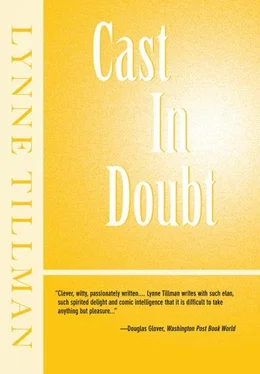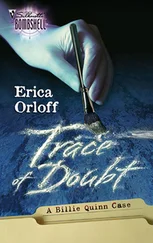Sometimes I look at her and remind myself: Helen was born when you were past forty, Horace, or she was born after the Korean War, or during the heyday of the abstract expressionists, which would mean nothing to her. Both aspects of the thought interest me — how old I was when she was born and that she wouldn’t care about that art movement or even the Korean War. I was moderately opposed to the Korean War. I was not indifferent to the abstract expressionists, though I was not convinced by them, either. They were so male, for one thing, and I distrusted their blatant masculinity. I admired the surrealists, Duchamp especially; he broke new ground. One saw the surrealists about New York in the forties, during the Second World War. In my heart of hearts, I have to confess a preference for Caravaggio, Matisse, Edward Hopper, and Cézanne. Where would the cubists have been without Cézanne!
In some ways I am in favor of what is new, almost on principle. I will argue this principle to the death, especially with Roger. Pop art was a welcome change — it leapt out when life was so dull, during the Eisenhower years, but it blossomed a little later, I remember. On a visit to New York in the sixties I saw marvelous art exhibitions. Gwen took me to the Factory, where I felt shy, and hung about awkwardly posing, and never did see Andy Warhol. I don’t think I could have managed it. I would have had to behave reverentially and he wouldn’t have found me attractive. But the boys around the Factory were wonderfully attractive, if somewhat frightening. The ambience was immensely different from that of the Cedar Tavern. Very perverse, but I enjoyed it even if it intimidated me. It was most assuredly a different intimidation from that created by those masculine painters with their burly arms and broad backs, who boldly discussed their paintings and their women — but mostly their paintings — over shots of Scotch and chasers of beer.
I assume Helen appreciates Andy Warhol, though she has mentioned only the group he spawned, the Velvet Underground, not that she ever saw them live, she explained to me. I am used not to seeing things live. Helen has never been to the Cedar Tavern. She has a dim recollection of hearing about it either when she was posing or when she took an art class from a bearded man who wore work shirts, a costume she found funny. By funny I think she means many things, but I’m afraid to pry too much.
It was the beginning of the time when Helen abjured any kind of naturalness and had dyed her hair and pierced her nose, for a nose ring. The nose ring, a stud, horrified Alicia. Smitty wears it less often these days, but when she does, it’s worn indifferently, almost as if it were meaningless, and perhaps it is to her. How Alicia went on about it! It fits Helen, though, to transform and mark her body. She is a bold canvas on which everything appears to have landed with abandon, with splatters here and there; and her scars, most invisible to the eye, and marks, tangible and intangible, about these nothing must be said. And no, no explanations will be given.
From her point of view, it may be that we’ve known each other all our lives, but mine is so much longer than hers. Yet this may account for her not needing to reveal herself to me in any specific sense. When Helen does reveal herself, she does it without guile, as if dropping her clothes before an audience of art students meant to study and render the female form. Along with artist’s modeling, she has done go-go dancing and stripping. Do you miss home? I ask her, as the sun dips low, peeking slyly above the horizon.
Helen first left home one summer when she was sixteen; she left it without regret, it seems, and casually mentions having taken up with a couple of guys and having gone on the road with a friend, hitchhiking. It is nearly inconceivable to me that she has actually done these things. Helen stripping and hitchhiking. When she attended college, briefly — and though they were not speaking, I gather — her parents paid her tuition. What did and do her parents think of her? Did John, does he, want to protect her? Do men still want to protect women, if they ever did?
Roger has been joined by a blond Adonis. It is not true that I take Roger’s castoffs. It is nearly opposite to the truth, not apposite to it. The blond may be Manolis, one of those feminine boys who fled to Athens. He’s matured excellently. Roger will take him in for a while, I know, then tire of him. Roger is a coquette, more coquettish than Helen has ever been, I’m sure. She glances from me to Roger several times, but says nothing. She is observing our scene and sometimes I feel queasy about this. She sips her coffee and asks, rather innocently, Does Roger pay him?
He may, I answer, disconcerted. I’m not sure why this question irks me. Perhaps she thinks I pry Yannis too. I won’t ask, though to a girl who has stripped for money this might not mean very much anyway. I change the subject abruptly, but she is unperturbed. I observe that she appeared to be excited earlier, when I saw her on her terrace. Had something happened? I ask. Helen stops eating. It was weird, she begins, which always signals to me some fresh revelation. She was reading and felt happy. She was happy for no reason. Nothing was really different. Yet she seems to have experienced a sudden rush, a release. Everything might be all right, after all. She knew suddenly, she said, that she could be whatever she wanted, because she could simply make it up. She felt freer. The past didn’t matter really. It was just a story, and she could always change the story. She asks if I have ever felt like that. Before I can respond, she says, with relish, that the only other time she ever was as happy was when she was watching a movie whose title she has forgotten, but it was as if she were a movie with a happy ending. Helen laughs quietly, her hand covering her mouth. I tell her she’s had an epiphany. She laughs even more.
Now she looks twelve. Unbearably defenseless. Part of her mask has dropped, and she’s stripped bare or stripping. She may reveal her true self to me. I don’t know what else to say to her. I ought to say something else but the expression on her face reminds me of myself at her age. I remember, even sense, my youthful expectation of life’s limitlessness, my naive belief in possibility. I would not have compared my self or my happiness with a movie’s end, but looking at her, I feel the crush of memory. And, as if memory were physical, it forces me lower in my chair. I drink more wine. I feel queasy, aware of an unspeakable emptiness below my heart. I take her hand and say something to the effect that, yes, Helen, everything will indeed be all right. I shut my eyes so that she won’t see that there are tears in them. But she pats my hand understandingly. It is suddenly darker. She is barely visible.
Impulsively, to pluck us from this dangerous and lugubrious patch, I announce what I meant not to tell her. I tell her almost comically, making light of it, that I visited John in the hospital, with Alicia. I emphasize the accidental nature of the visit, my surprise as to his identity and their connection, and so on. You’re kidding, Helen responds, and then grows pensive. She adds, If you’re not, it’s unbelievable. It stinks.
Stinks? I hadn’t really expected her not to believe me. I don’t see, I answer, why you’re so angry. It’s simply true. I had no idea, and frankly, dear, I don’t like being told that any of my stories stink. Helen withdraws into herself for a while, but she doesn’t leave the table. I question why I care, of course, why I allow her feelings any importance at all. She’s just a young girl who knows nothing; and surely it is I who invests her with power.
I study Helen and recognize a child, hurt, alone, anxiously searching, looking at the sea and the wide world, which I know is smaller and more impenetrable than the object of her gaze suggests. Attempting to dismiss her doesn’t work, as I genuinely like her and am attached to her against my better judgment. In a state, I nervously consume another glass of wine, nearly gagging as it goes down. Helen speaks at last and claims that she doesn’t like liars very much, even though she lies sometimes. “I lie. People lie all the time. But you should admit it.” In this moment she reminds me of Gwen.
Читать дальше












